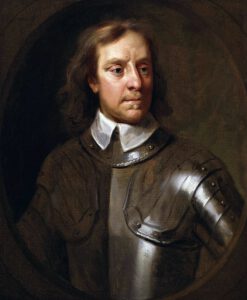Oliver Cromwell
*04/1599
†09/1658
Parents
Father: Robert Cromwell
Mother: Elizabeth Stewart
Children
1 Son
Appointment to Lordprotector
12/1653
Regency
1651 to 1658
After his Education at Cambridge, Oliver Cromwell worked from 1628/29 in the House of Commons of the english Parliament.
In the time when Charles I. ruled without a Parliament (1629-40), Cromwell lived as a wealthy Landowner. When the Parliament was reconvened in 1640, he supported among others John Pym, as this brought the Protest Note against the King.
After Charles dissolved the Parliament again, he rose in the next Civil War quickly to a Major General and led the Army against Royale Troops. He also led the Troops in the recapture of Ireland, after the mostly catholic Population rose against Nobles, protestant Settlers. He had Ireland occupied by Parliamentary Troops and gradually conquered the Cities on the Coast to secure the supplies.
After the conquest of Drogheda, 3,500 people were murdered: about 2,700 royal Soldiers and all the weapon-carrying Men. It did not matter if he was a Civilian, a Prisoner or a catholic Priest. When the Republic was proclaimed after the Execution of Charles I., he was Part of the Government in the parliamentary House of Commons and had to counteract Uprisings by Soldiers – they mutinied because they were not paid the outstanding Pay.
Cromwell’s foreign Policy was quite nationalist, as the Naval Records of 1651 show. Accordingly, trade and fishing were only allowed under the british Flag. Above all, he wanted to prevent the Dutch trade with England and its Colonies, which led to the dutch-english Sea War (1652-54) and ultimately made England the first Sea and Commercial Force. From the dissolution of Parliament in December 1653, he led the Title of Lordprotector (Patron), dismissed the Cabinet and acted against Parties who were committed to Democracy, Equality and the petty bourgeoisie. Gradually Cromwell nourished a military Dictatorship and even made the Title Lordprotector hereditary. Despite everything, he was offered the Royal Dignity in 1657 by the Parliament, which he refused.
Cromwell died of Malaria in September 1658.
After Charles II. was awarded the Royal Dignity in 1660, Cromwell’s Body and that of two others was exhumed and posthumously, because of Charles I., executed symbolically as a regicide.
As a deterrent, their Heads were publicly placed on Poles.
Parts of the Happenings were filmed in ‘Cromwell’ from 1970 and ‘Charles I. – To kill a King’ from 2003.
Oliver Cromwell | Richard Cromwell
